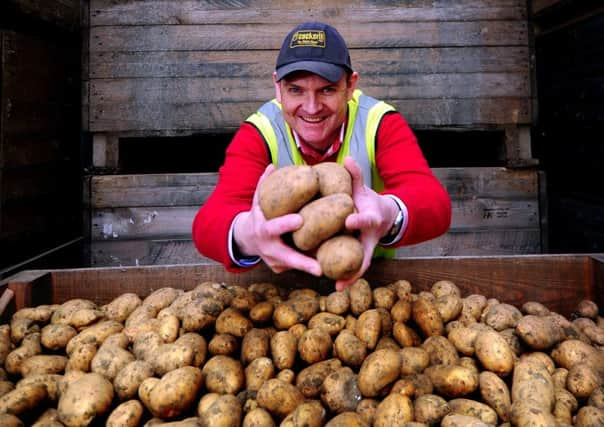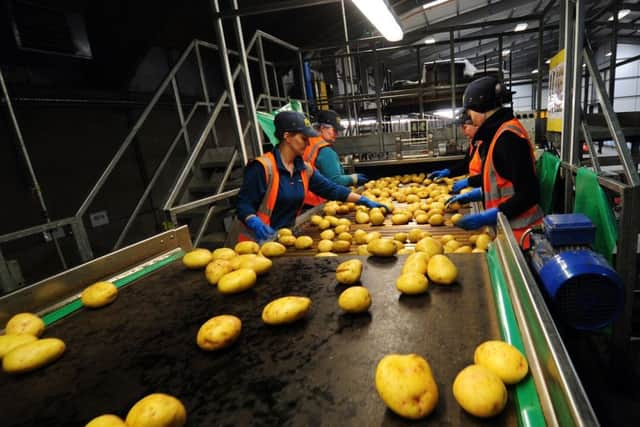Race to the bottom puts strain on potato supplies


Whether you’re a jacket person or prefer yours boiled, roasted, fried, mashed, turned into crisps or chips, either as fries, chunky or twice-cooked the potato market is a varied beast.
Rufus Pilgrim has seen the potato industry revolution that has taken place during his past 25 years, and over the past year, having been awarded a Nuffield Scholarship to research the sector’s future, he has travelled the world to better understand the UK growers’ platform for expansion in potatoes.
Advertisement
Hide AdAdvertisement
Hide AdHaving come from Colton, near Tadcaster, with no family farming background, he started working for arable farmer John Piercy when in his teens, helping to harvest potatoes.


Rufus studied for his Higher National Diploma at Shuttleworth Agricultural College in Bedfordshire undertaking his thesis on potato production. His career has taken in assistant farm manager on a potato farm in Norfolk; fieldsman on potato procurement for GA Bowskill in Lincolnshire.
He moved on to QV Foods in Lincolnshire and spent five years managing procurement for their Tesco business and then for their Marks & Spencer trade with a stand-alone company called Manor Fresh. He’s been with RS Cockerill for four years.
“I’ve been really lucky to have been able to work on supplying major companies throughout my career and have seen how markets have changed.
Advertisement
Hide AdAdvertisement
Hide Ad“I came back to Yorkshire to work at Providence Farm on Stamford Bridge Road. The company is run by Martin Cockerill, a great innovator who understands people development. I’m the commercial director for the fresh potato business. We have another commercial director Mike Dangerfield who looks after the 42-grower group that supplies crisping potatoes into Pepsico predominantly for Walkers crisps. My side is fresh potato production. We have around 80 farmer suppliers from Yorkshire and North Lincolnshire.


“Our biggest customers are Aldi and Lidl. This side of the business has grown 35 per cent in the time I’ve been here and it’s entirely down to these two now major players.”
While the growth attained by Rufus and his team at Cockerill’s is laudable, he’s thinking longer term to the sector’s future and what will happen if purchasing at the lowest common denominator on price is pursued further.
“There’s been a huge level of rationalisation in my time with the number of people involved in the industry having diminished by one-third and where there were 7,000 potato growers in the UK in the 90s the current figure is just under 2,000 and there is still room for that to dip further. The tonnage grown has dropped a little as has the acreage but greater irrigation, more productive varieties and precision agriculture techniques have improved the yield.
Advertisement
Hide AdAdvertisement
Hide Ad“My concern, and the reason for putting myself forward as a Nuffield scholar to research the industry further, was that in the era of the discount retailer we have this chase of the lowest common denominator while also supplying customers with good quality produce. The costs of growing potatoes and the barriers to entry because of it are huge. We now have more specialist growers than ever before but if growers dive out of the sector because they can’t make it pay where are the potatoes I need to fulfil our requirements?”
Rufus’ travels have taken in Europe, South Africa, Kenya, Canada and Idaho in the US.
“I wanted to see what others were doing to secure supply chains. I toured northern and central Europe including Germany, Belgium, Holland, Czech Republic, Poland and Hungary. They are low cost producers and it shows. I found their produce nowhere near our quality.
“We have some of the most sophisticated shoppers in the world who are used to good quality fresh produce and are very conscious of where their food has come from and that is helping with UK production, but it is the processing side that is where Europe is very real competition. The fresh potato market around the world is falling as people eat more processed and chilled products - convenience food and the market for French fries is going crazy, and with the populations of Africa and Asia set to double by 2050 there’s a very real rush to this market.
Advertisement
Hide AdAdvertisement
Hide Ad“Kenya has 800,000 farmers producing appalling yields of 10 tonnes per hectare (the UK average is 45 tonnes). This is an area where we could export our skills, educate their next generation about certified seed production and generally improve productivity.”